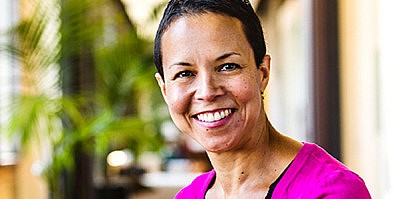
Fifteen years into her legal career, Kelly Brown could see that her industry had entered a period of rapid transformation. The legal landscape, she says, was “experiencing changes that were accelerating the need to innovate and transforming law firms into more complex businesses,” and she wanted to place herself at the forefront of innovation in her field.
She came to the Wharton School to study how law firms could deliver superior value by adopting business practices from other fields, and in 2014 she received a Mack Institute MBA Research Fellowship to conduct market research in the legal industry.
Traditionally, the legal industry has been characterized by conservatism. However, as consumer centricity becomes increasingly prominent in the digital age, the world of law is not immune to disruption. In her study, Enter the Disrupters: How New Law Firm Rivals are Disrupting the Market for High-end Legal Services in the U.S. (PDF), Brown examines the effects of globalization, technological innovation, and liberalization on the legal industry, particularly the risks innovation poses to existing players if they do not adapt and evolve. Building on her research, Brown has now co-authored a new article that expands upon the initial findings and implications of her study.
With Andy Daws, North American Vice President of Riverview Law, Brown uses scenario decision strategy to explore the legal industry’s “next wave of radical change.” This method involves identifying two key uncertainties and using them to build a matrix of four possible outcomes that reflect the potential results of continued market evolution. To forecast the future of the legal industry, Brown and Daws selected “the pace of globalization and the pace at which clients adopt or switch to alternative technology-focused options that replace traditional legal service delivery models.”
Brown and Daws ultimately focus on a scenario they call, “Law Networked,” and paint a picture of an imagined legal landscape for “New Law” and “Big Law” in the year 2030: Liberalization has spread from Australia and the UK to other parts of the globe , and the U.S. can do little to resist the loosening of regulations. Law Networked also embraces “emerging technologies such as “Artificial Intelligence (AI), Machine Learning, and Machine-to-Machine,” meaning that computers can do most of what lawyers could do fifteen years before at a fraction of the price.
In their vision of 2030, New Law has “fully moved from a services business enabled by technology to a technology-led patent-protected business that provides services.” The consumer has become the core focus of these “productized” service solutions. Big Law, comprised of select surviving traditional law firms, has also been increasingly assaulted by competition from elite accounting firms as jurisdiction becomes less and less of a concern.
This sketch of the future is, of course, merely provocative speculation, and both New Law and Big Law will continue to evolve and reinvent themselves in unforeseen ways. Nevertheless, a core conclusion that Brown and Daws draw is that a consumer-centric commercial approach, combined with an ability to build innovation capabilities, will help firms “weather the storms of globalization and technological advancement.” As law firms adapt to disruptive forces and develop increasingly intricate business plans, business and law increasingly intersect, as already seen in the development of dual JD/MBA programs such as the 3-year JD/MBA program offered by Wharton and Penn Law. No matter where law actually ends up in the future, it is clear that industry-wide change is on the horizon.
Kelly M. Brown graduated from the Wharton Executive MBA program in Spring 2014 and was the recipient of the Ben Franklin Award. She is currently the director of client relations at Morrison & Foerster LLP.
Andy Daws is Vice President of the North America region for Riverview Law, a “New Law” firm aspiring to “change the way organizations use, measure and buy legal services”.
The Mack Institute MBA Research Fellowship is now the Collaborative Innovation Program. Students under faculty guidance address real-world innovation management challenges submitted by Mack Institute corporate partners.



